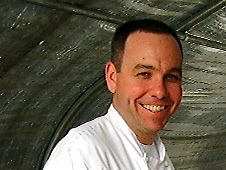
reference-image, l
(article, Liz Crain)
[%pageBreakSettings nobreak=true] p(blue). Based in Portland, Oregon, Joe McGarry is a regional chef for the Bon Appétit Management Company, a large-scale food-service company. Founded in 1987, Bon Appétit has more than 10,000 employees staffing a range of venues, including university cafés and on-site restaurants for corporations. Progressive company-wide initiatives include eliminating trans fats and sourcing all-natural beef and cage-free eggs. Tell me about the farm visits you coordinate for your cooks. We've actually got a couple of new farms that we're using this year. One of our chefs, Micah Cavolo, has been working really hard to coordinate with this farm, Dos Sequoias Farm, that operates under a CSA named Abundant Harvest. They are probably the closest farm to \[a\] site that we've ever worked with — just 10 minutes away. [%image mcgarry float=left width=250 credit="Photo courtesy Joe McGarry" caption="Joe McGarry, left, with farmer Charlie Harris of Flamingo Ridge Organics in Gaston, Oregon."] We're also now starting to complete the circle by taking all of our compost to Olsen Family Farm, another farm that we work with that's a part of Abundant Harvest. We go out on Mondays, drop off our compost, and come back with the week's produce delivery. We're thinking things through a little more here. Do all Bon Appétit chefs write weekly menus? Everybody does, every week. Without that, we couldn't do a lot of things that we're able to do. It helps us stay tuned into the local bounty with the harvest as well as all of our weird weather. It's a critical part, and it's fun too. We've got farmers who are really dialed in to our menu cycles, like Steve Radtke of Dos Sequoias Farm. He is really on it, to the point that where every Thursday, knowing that that's when we're trying to finish up our menus for the following week, he'll send us his availability list. Anything that he's questionable about, he'll let us know; if he's limited on figs, he'll put a cautionary line afterward. It's not just us who are progressing; it's the farmers that we're working with who are progressing as well. What was your recent regional meeting like? On Saturday morning, they gave us a pocketful of money and sent us down to the farmers' market; they broke us up into teams and we went for a real big shop. After that we sat through some meetings and exercises, and then everyone put on an apron and got to work in the kitchen preparing dinner with the stuff we bought at the market. You know, you're looking around, and there are 30 or 40 people in the kitchen, all working on little projects to kind of put it out family style. There's just real camaraderie and a cohesiveness. And you know a lot of these people only see each other about once a year, or haven't even met. For that to instantly happen and have food be the medium — local food at that — is pretty special. How was your reef-netting trip to Lummi Island this year? It was a blast. Chefs in Raingear is a really great program; it's just one more way to connect chefs with their food sources so that they realize that these beautiful fish aren't just falling from the sky. What's reef-netting? It's an old Native American technique of catching fish in their schools that's regarded as the most sustainable method of salmon fishing. Basically, divers go down and create kind of a reef, a mock reef. As the schools of fish come through the straits and head toward the Fraser River, the reef is kind of an indicator to them for where they want to head. It makes them turn a little earlier. At the end of this mock reef are two barges (called gears) with a net in between them. It's a pretty finely meshed net, so that no fish get caught with their heads partially through. So then the catch comes on board. They first go into the live tank and kind of calm down, and then they're actually bled right there on board in bleeding tanks. It's just such a more humane way of catching fish, as opposed to gill-netting; those poor fish would be in totes, still partially alive, suffocating or flopping around on deck on a boat, for a long time. It gets you the fish in better shape, and you feel better about it because of the humanity toward the fish that you're catching. What would you most like to see change in the food industry? I think a major issue is what's going on in California with the Leafy Green marketing campaign. Because of what happened with spinach last year, I think that that's a niche of our industry that really needs to be monitored. When you start processing food and throw in that variable of whether it's clean spinach or chopped romaine or whatever it is, it's no longer coming directly from the farm, who you'd expect to take great care, to the distributor, to the kitchen. Now you've thrown in this other aspect of processing, which we all found with spinach last year, can be very scary. I know that with the Community Alliance with Family Farmers in California, this is very big right now. I wholeheartedly support everything that they're doing. How do you see Bon Appétit evolving in the future? I think that we're just starting to broaden the scope of the impact that we can make. I think we've established great connections with local producers. Like with our composting program, dropping off compost and returning with a van full of fresh vegetables all in one trip. With this, we're allowing the farmers to stay on the farm, where they belong and where they want to be. I think it's little things like that: fine-tuning for bigger impact. p(bio). Liz Crain is a writer in Portland, Oregon.

reference-image, l

mcgarry, l